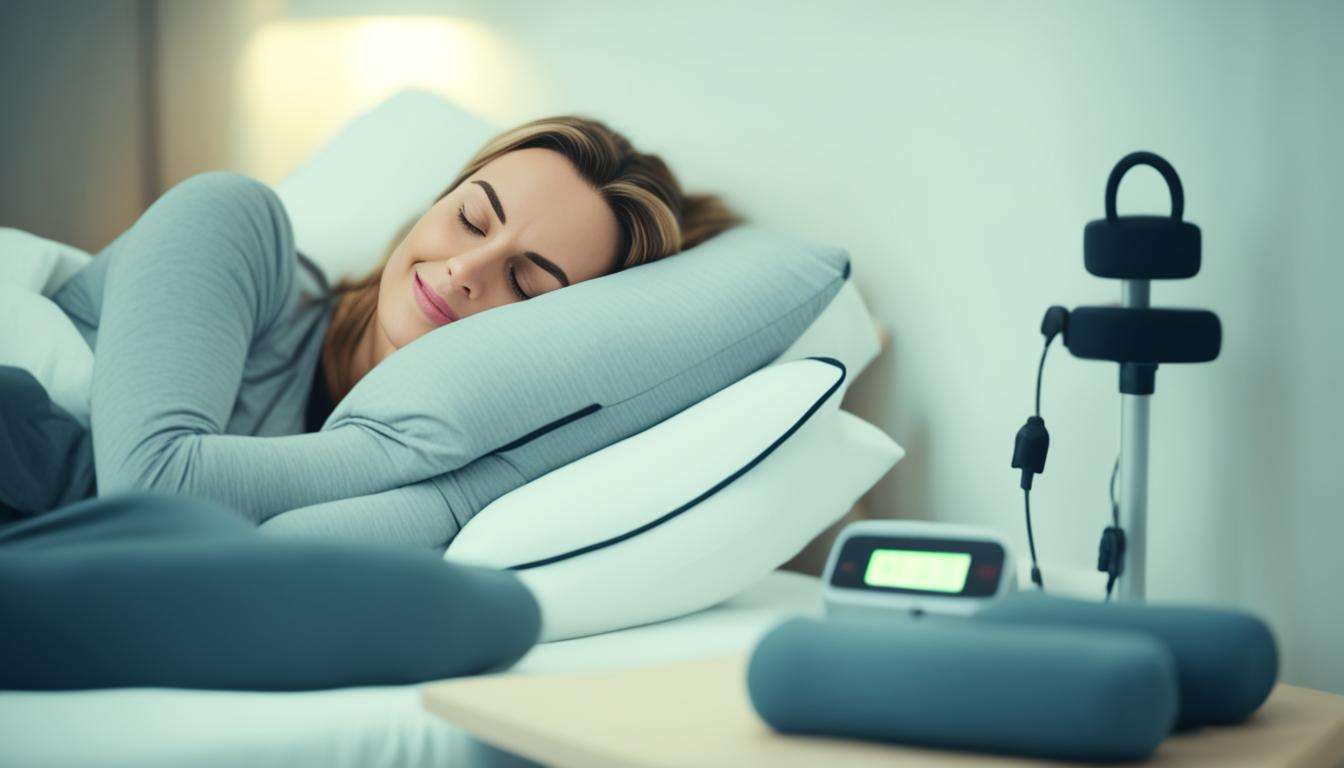Enhancing your sleep quality through fitness and nutrition is crucial for your overall health and wellness. How to Improve Your Sleep with Fitness and Nutrition? emphasizes the powerful influence that integrating fitness and nutrition into your daily routine can have on the quality of your sleep.
By incorporating healthy sleep habits, regular exercise, and a balanced diet into your routine, you can enhance your sleep quality and wake up refreshed and rejuvenated. This approach has multiple benefits, including improving mood, boosting the immune system, and enhancing cognitive function. It is a comprehensive strategy for achieving better sleep.
Key Takeaways:
- Healthy sleep habits, regular exercise, and a balanced diet can improve sleep quality.
- A bedtime routine and good sleep hygiene practices promote better sleep.
- Exercise, both aerobic and resistance training, enhances sleep quality and reduces the risk of sleep problems.
- Nutrition plays a vital role in sleep quality, and certain nutrients are associated with better sleep.
- Consistency in sleep and wake times helps regulate your body’s circadian rhythm and improves sleep quality.
The Relationship Between Diet, Exercise, and Sleep
Diet, exercise, and sleep are closely interconnected, with each having a significant impact on the other. Your dietary choices play a crucial role in various aspects of your health, from reducing the risk of health conditions to influencing your mental well-being.
When it comes to sleep, combining a healthy diet with regular exercise offers more benefits than solely focusing on improving your diet. The food you consume can directly affect the quality and duration of your sleep. For instance, consuming caffeine close to bedtime or indulging in late-night eating can interfere with your sleep patterns, making it harder to achieve a restful night’s sleep.
On the other hand, exercise has been proven to be beneficial for sleep. Engaging in both aerobic and resistance exercises can help improve sleep quality, making it easier to fall asleep and stay asleep throughout the night. Regular physical activity also reduces the risk of sleep problems such as insomnia, obstructive sleep apnea, and restless legs syndrome.
The relationship between diet, exercise, and sleep extends beyond individual benefits. When combined, they create a positive and reinforcing cycle. Eating a healthy diet not only provides your body with the necessary nutrients for optimal sleep but also reduces the likelihood of overeating and making poor food choices due to sleep deprivation. Conversely, maintaining a consistent exercise routine can aid in weight management and contribute to better sleep quality.
“The food you eat can be either the safest and most powerful form of medicine or the slowest form of poison.”
In summary, understanding the relationship between diet, exercise, and sleep is crucial for achieving and maintaining healthy sleep patterns. By making informed choices about your diet, incorporating regular exercise into your routine, and prioritizing quality sleep, you can optimize your overall well-being and enjoy improved sleep quality.
Improving Sleep Through Diet and Exercise
When it comes to improving sleep, incorporating changes to your diet and exercise routine can have a significant impact. Both diet and exercise play a crucial role in promoting better sleep quality and overall sleep health.
A balanced diet is essential for providing the necessary nutrients that support proper sleep. Some nutrients, such as magnesium and vitamins A, C, D, and E, have been associated with improved sleep quality. A diet rich in fruits, vegetables, and whole grains can help ensure you’re getting these essential nutrients. Additionally, it’s important to avoid caffeine and large meals before bed, as they can disrupt sleep patterns and make it harder to fall asleep.
Exercise, particularly aerobic and resistance exercises, has been shown to enhance sleep quality. Regular physical activity can help regulate the body’s circadian rhythm, making it easier to fall asleep and stay asleep throughout the night. Studies have also found that exercise can reduce the risk of sleep problems like insomnia and sleep apnea.
| Diet for Better Sleep | Exercise for Better Sleep |
|---|---|
|
|
By focusing on both diet and exercise, you can create a healthy sleep routine and improve your overall sleep quality. Remember to consult a healthcare professional before making any significant changes to your diet or exercise program, especially if you have any underlying health conditions.

The Impact of Nutrition on Sleep
Nutrition plays a vital role in sleep patterns. A healthy diet, rich in vegetables and fruits, provides essential vitamins and minerals that promote better sleep. Key nutrients like calcium, magnesium, and vitamins A, C, D, and E are associated with improved sleep quality.
A study published in the Journal of Clinical Sleep Medicine found that individuals with higher intakes of vitamin C and iron had fewer sleep disturbances, while low intakes of vitamin D were associated with poorer sleep quality and shorter sleep duration.
Diets like the Mediterranean Diet and the DASH (Dietary Approaches to Stop Hypertension) Diet have been found to enhance sleep quality. The Mediterranean Diet, rich in fruits, vegetables, whole grains, and lean proteins like fish and poultry, is associated with reduced sleep apnea symptoms. Similarly, the DASH diet, which emphasizes fruits, vegetables, low-fat dairy, and lean proteins, has been linked to improved sleep quality.
However, it is important to note that nutrition is multifaceted, and further research is needed to identify the specific sleep benefits of different diets. It is always recommended to consult a doctor or nutritionist who can provide personalized recommendations for nutrition and sleep improvement.
Foods Rich in Nutrients for Sleep
| Nutrient | Foods |
|---|---|
| Calcium | Dairy products, leafy greens (kale, spinach), fortified plant-based milk |
| Magnesium | Almonds, cashews, legumes, whole grains, dark chocolate |
| Vitamin A | Carrots, sweet potatoes, spinach, kale, liver |
| Vitamin C | Citrus fruits, strawberries, bell peppers, broccoli |
| Vitamin D | Fatty fish (salmon, mackerel), fortified dairy products, egg yolks |
| Vitamin E | Nuts (almonds, peanuts), seeds (sunflower seeds, flaxseeds), spinach, broccoli |
Including these nutrient-rich foods in your diet can contribute to better sleep quality and overall sleep health. Remember, a well-balanced diet is key to supporting a good night’s rest.
How Sleep Affects Nutrition
Sleep plays a crucial role in maintaining proper nutrition and a healthy body weight. Insufficient sleep can have a significant impact on your dietary choices and overall nutrition. When you don’t get enough sleep, it can lead to an increased risk of obesity, as well as higher food consumption, and a preference for calorie-dense foods.
One of the reasons for this is that sleep deprivation affects the hormones that regulate appetite and hunger. When you’re sleep-deprived, the levels of ghrelin, the hunger hormone, increase, while the levels of leptin, the hormone that signals fullness, decrease. This hormonal imbalance makes it more challenging to make healthy food choices and can lead to overeating.
In addition to affecting hormone regulation, poor sleep can also impact your food preferences. Research has shown that sleep deprivation can increase cravings for high-carbohydrate and high-fat foods, making it harder to stick to a balanced diet.
Sleep plays a crucial role in maintaining proper nutrition and a healthy body weight. Insufficient sleep is associated with an increased risk of obesity, higher food consumption, and a preference for calorie-dense foods.
On the other hand, getting enough sleep can have a positive impact on your dietary decision-making. When you’re well-rested, you’re more likely to make healthier food choices, reaching for nutrient-dense foods rather than relying on quick fixes like sugary snacks or fast food.
Furthermore, adequate sleep supports weight management efforts. Sleep helps regulate the hormones that control your metabolism, such as insulin, cortisol, and growth hormone. When these hormones are in balance, it becomes easier to maintain a healthy body weight.
| Sleep and Nutrition: | Key Takeaways: |
|---|---|
| Sleep deprivation | Increased risk of obesity and higher food consumption |
| Poor sleep | Preference for calorie-dense foods and unhealthy dietary choices |
| Adequate sleep | Improved dietary decision-making and support for weight management efforts |
The Role of Hormones in Sleep and Nutrition
Understanding the impact of sleep on nutrition requires considering the role of hormones. Hormones such as ghrelin and leptin play a crucial role in regulating appetite and hunger. Sleep deprivation disrupts the balance of these hormones, leading to increased cravings, decreased satiety, and a higher likelihood of consuming unhealthy foods.
Getting enough sleep helps restore the hormonal balance, making it easier for you to make nutritious choices and maintain a healthy body weight.

Tips for Better Sleep
To improve your sleep quality, it’s important to establish good sleep hygiene habits. Here are some tips to help you achieve a more restful night:
Increase Bright Light Exposure During the Day
Exposing yourself to bright light during the day helps regulate your body’s internal clock and promotes better sleep at night. Spend time outdoors or near windows, especially in the morning.
Reduce Blue Light Exposure in the Evening
Electronic devices such as smartphones, tablets, and computers emit blue light that can disrupt your sleep patterns. Limit your exposure to these devices in the evening or consider using blue light-blocking glasses or screen filters.
Avoid Consuming Caffeine Late in the Day
Caffeine is a stimulant that can interfere with your ability to fall asleep. Avoid consuming caffeine in the afternoon and evening, as it can stay in your system for hours.
Regulate Daytime Napping
To improve your sleep quality, it’s best to avoid taking long or late afternoon naps if you’re having trouble falling asleep at night. Try to keep naps to a minimum and take them early in the day if you do nap.
Establish Consistent Sleep and Wake Times
Creating a regular sleep schedule helps regulate your body’s internal clock and promotes healthier sleep patterns. Try to go to bed and wake up at the same time every day, even on weekends.
Consider Taking a Melatonin Supplement
Melatonin is a hormone that helps regulate sleep-wake cycles. If you’re having trouble falling asleep, consult with your healthcare provider about the appropriate use of melatonin supplements.
Explore Other Sleep-Promoting Supplements
Some natural supplements, such as Ginkgo biloba, glycine, valerian root, magnesium, L-theanine, and lavender, have been reported to have sleep-promoting properties. Before taking any supplements, consult with your healthcare provider to ensure their safety and effectiveness for you.
Create an Optimal Bedroom Environment
Your bedroom environment plays a crucial role in promoting better sleep. Minimize noise, light, and distractions to create a peaceful and relaxing sleep environment. Consider using earplugs, eye masks, or white noise machines if needed.
Implementing these tips can help improve your sleep quality and overall well-being. Remember, everyone’s sleep needs may vary, so it’s important to find what works best for you.
The Role of Alcohol in Sleep
Alcohol and sleep may not be the best combination. While many people believe that alcohol can help promote sleep, it actually has negative effects on the quality of your sleep. Here’s why:
- Disrupts sleep patterns: Alcohol can disrupt the natural sleep patterns by interfering with the different stages of sleep. It reduces REM sleep, which is essential for a restful and restorative sleep.
- Worsens sleep apnea and snoring: Alcohol relaxes the muscles in the throat, resulting in increased snoring and a higher likelihood of sleep apnea episodes for individuals with the condition.
- Inhibits melatonin production: Melatonin is a hormone that regulates the sleep-wake cycle. Alcohol inhibits its production, making it more difficult to fall and stay asleep.
- Affects growth hormone levels: Alcohol consumption can interfere with the natural nighttime elevations in human growth hormone, which is necessary for tissue repair and growth.
To improve your sleep quality, it’s best to avoid alcohol close to bedtime. While it might help you fall asleep faster, it will likely disrupt your sleep and leave you feeling tired and groggy the next day.

| Effects of Alcohol on Sleep Quality | Consequences |
|---|---|
| Disruption of natural sleep patterns | Reduced restorative sleep, increased fatigue |
| Worsening of sleep apnea and snoring | Impaired breathing, disturbed sleep |
| Inhibition of melatonin production | Difficulty falling and staying asleep |
| Affecting growth hormone levels | Impaired tissue repair and growth |
Optimizing Your Bedroom Environment for Better Sleep
Your bedroom environment plays a significant role in the quality of your sleep. Various factors such as temperature, noise, external lights, and furniture arrangement can have a profound impact on your ability to sleep well. By optimizing your bedroom environment, you can create a sleep-friendly space that promotes relaxation and restful sleep.
To create an optimal bedroom environment, consider the following:
Minimize External Noise
Noise from outside can disrupt your sleep and prevent you from entering deep sleep stages. Use earplugs or consider using a white noise machine to mask any external sounds that may disturb your sleep.
Control the Lighting
External lights, such as streetlights or the glow from electronic devices, can interfere with your body’s ability to produce melatonin, a hormone that regulates sleep. Use blackout curtains or blinds to block out external lights and create a darker sleeping environment. Also, it may be beneficial to incorporate blue-light-blocking glasses into your routine before going to bed. This can lessen the potential harm that blue light from electronic devices may cause.
Create a Clean and Relaxing Space
Your bedroom should be a clean and clutter-free space that promotes relaxation. Remove any unnecessary items or clutter that can cause stress or anxiety. Keep your bedroom well-ventilated and at a comfortable temperature for better sleep. Consider investing in a comfortable mattress, pillows, and bedding that suit your preferences for restful sleep.
Invest in Sleep-Enhancing Tools
There are various tools and aids available that can help optimize your bedroom environment for better sleep. For example, using a white noise machine or a fan can create a soothing background noise that masks other sounds. Essential oils like lavender can promote relaxation and enhance sleep quality. Experiment with different sleep-enhancing tools to find what works best for you.
Remember, everyone’s sleep preferences and needs are unique. It’s important to create a sleep-friendly environment that suits your personal preferences and promotes restful and rejuvenating sleep.
| Factors to Consider | Steps to Optimize |
|---|---|
| Noise | Use earplugs or a white noise machine to minimize external noise. |
| Lighting | Use blackout curtains, blinds, and blue-light-blocking glasses to control lighting. |
| Cleanliness and Organization | Create a clean, clutter-free space that promotes relaxation. |
| Comfort | Invest in a comfortable mattress, pillows, and bedding. |
| Sleep-Enhancing Tools | Consider using white noise machines, fans, and essential oils to enhance sleep quality. |
The Benefits of Bright Light Exposure and Blue Light Reduction
Exposure to natural light or bright light during the day helps regulate your circadian rhythm, promoting better sleep quality and energy. On the other hand, too much exposure to blue light, especially in the evening from devices like smartphones and computers, can disrupt your natural sleep-wake cycle.
Increasing bright light exposure during the day and reducing blue light exposure in the evening can enhance sleep quality and help maintain a healthy sleep-wake pattern.
Consistency in Sleep and Wake Times
Setting a consistent sleep schedule, including regular sleep and wake times, is crucial for improving sleep quality. When you have a consistent sleep routine, your body’s internal clock can regulate your circadian rhythm more effectively. This helps to establish a stable sleep-wake cycle and promotes better sleep.
Inconsistent sleep patterns, such as irregular bedtimes and wake times, can disrupt your internal clock and lead to difficulties falling asleep or staying asleep. Your body relies on consistent timing cues to release the sleep-inducing hormone melatonin, which regulates your sleep-wake cycle. Disruptions to this cycle can result in poor sleep quality and daytime drowsiness.
By adhering to a regular sleep schedule, you can enhance your overall sleep quality. This means going to bed and waking up at the same time every day, including weekends. While it may be tempting to sleep in or stay up late on weekends, it can throw off your sleep routine and make it harder to adjust back to your regular schedule on weekdays.
Consistency in sleep and wake times can also help improve sleep hygiene. Sleep hygiene refers to practices and habits that promote healthy sleep. By sticking to a consistent routine, your body becomes accustomed to the timing of sleep, making it easier to fall asleep and wake up naturally without relying on alarm clocks or stimulants.
Creating a consistent sleep routine involves setting a consistent bedtime and wake time that allows for sufficient sleep duration. The recommended amount of sleep for adults is 7-9 hours per night. It’s important to prioritize a bedtime that enables you to achieve this recommended sleep duration consistently.
A consistent sleep schedule is one of the most effective strategies for improving sleep quality and maintaining optimal health. By keeping a regular sleep routine, you can synchronize your body’s natural sleep-wake cycle and experience the benefits of a well-rested mind and body.
| Benefits of Consistency in Sleep |
|---|
| 1. Improved sleep quality |
| 2. Enhanced sleep hygiene |
| 3. Better synchronization of circadian rhythm |
| 4. Reduced sleep difficulties |
| 5. Increased daytime alertness |
Key Takeaways:
- Setting consistent sleep and wake times helps regulate your body’s internal clock and improves sleep quality.
- Inconsistent sleep patterns can disrupt your circadian rhythm and impact melatonin levels, leading to sleep difficulties and daytime drowsiness.
- Consistency in sleep schedules promotes better sleep hygiene and allows your body to establish a natural sleep-wake cycle.
- A consistent sleep routine involves going to bed and waking up at the same time every day, even on weekends.
- The benefits of consistency in sleep include improved sleep quality, enhanced sleep hygiene, and increased daytime alertness.
Conclusion
In conclusion, improving sleep quality through fitness and nutrition is crucial for your overall health and well-being. The complex interplay between diet, exercise, and sleep demonstrates how each aspect influences the other. By incorporating a balanced diet rich in nutrients and engaging in regular exercise, you can enhance the quality of your sleep.
On the flip side, poor sleep can lead to unhealthy food choices and weight gain. It’s important to prioritize sleep to avoid these negative effects on your overall health. By following tips for better sleep, optimizing your bedroom environment, and establishing consistent sleep and wake times, you can significantly improve your sleep quality and promote better overall health.
Remember, a healthy diet, regular exercise, and good sleep hygiene are essential for achieving restful nights and waking up refreshed. Take charge of your sleep by making informed choices that prioritize your well-being. By taking care of your body through fitness and nutrition, you can unlock the benefits of better sleep and optimize your overall health and vitality.
FAQ
How can fitness and nutrition improve sleep quality?
Fitness and nutrition play a crucial role in improving sleep quality. Regular exercise, especially aerobic and resistance exercises, has been shown to enhance sleep quality and reduce the risk of sleep problems. A balanced diet, rich in nutrients like calcium, magnesium, and vitamins A, C, D, and E, promotes better sleep. By incorporating exercise into your routine and making healthy food choices, you can improve your sleep quality.
What is the relationship between diet, exercise, and sleep?
Diet, exercise, and sleep have a complex relationship, with each influencing the other. A healthy diet provides essential nutrients for quality sleep, while exercise benefits nearly every system in the body and improves sleep quality. Getting enough sleep also supports weight management efforts and reduces the risk of overeating and poor food choices.
How can diet and exercise improve sleep?
Diet and exercise can improve sleep quality by providing the necessary nutrients for proper sleep and promoting physical and mental relaxation. Eating a balanced diet, avoiding caffeine and large meals before bed, and incorporating regular exercise, especially aerobic and resistance exercises, can enhance sleep quality and reduce the risk of sleep problems.
What is the impact of nutrition on sleep?
Nutrition plays a vital role in sleep patterns. A healthy diet, rich in vegetables and fruits, provides essential vitamins and minerals that promote better sleep. Key nutrients like calcium, magnesium, and vitamins A, C, D, and E are associated with improved sleep quality. Diets like the Mediterranean Diet and the DASH diet have been found to enhance sleep quality.
How does sleep affect nutrition?
Sleep plays a crucial role in maintaining proper nutrition and a healthy body weight. Insufficient sleep is associated with an increased risk of obesity, higher food consumption, and a preference for calorie-dense foods. Poor sleep also affects hormones that regulate appetite and hunger, making it more difficult to make healthy food choices. Getting enough sleep can improve dietary decision-making and support weight management efforts.
What are some tips for better sleep?
To improve sleep quality, consider implementing the following tips:
– Increase bright light exposure during the day.
– Reduce blue light exposure in the evening.
– Avoid consuming caffeine late in the day.
– Regulate daytime napping.
– Establish consistent sleep and wake times.
– Consider taking a melatonin supplement.
– Explore other sleep-promoting supplements like Ginkgo biloba, glycine, valerian root, magnesium, L-theanine, and lavender.
– Create an optimal bedroom environment by minimizing noise, light, and distractions.
What is the impact of alcohol on sleep?
Alcohol consumption before bed can have negative effects on sleep. It can worsen sleep apnea, and snoring, and disrupt sleep patterns. Alcohol also inhibits melatonin production and can affect the natural nighttime elevations in human growth hormone. Avoiding alcohol close to bedtime can contribute to better sleep quality.
How can I optimize my bedroom environment for better sleep?
Your bedroom environment plays a significant role in sleep quality. Factors like temperature, noise, external lights, and furniture arrangement can impact sleep. Minimizing external noise and light, creating a clean and relaxing space, and investing in measures like wearing blue-light-blocking glasses and using blackout curtains can help optimize your bedroom environment for better sleep.
What are the benefits of bright light exposure and reducing blue light?
Exposure to natural light or bright light during the day helps regulate your circadian rhythm, promoting better sleep quality and energy. On the other hand, too much exposure to blue light, especially in the evening from devices like smartphones and computers, can disrupt your natural sleep-wake cycle. Increasing bright light exposure during the day and reducing blue light exposure in the evening can enhance sleep quality and help maintain a healthy sleep-wake pattern.
Why is consistency in sleep and wake times important?
Setting a consistent sleep schedule, including consistent sleep and wake times, can help regulate your body’s circadian rhythm and improve sleep quality. Irregular sleep patterns can disrupt your internal clock and impact melatonin levels, which regulate your sleep-wake cycle. By adhering to a regular sleep routine, even on weekends, you can establish healthy sleep patterns and enhance overall sleep quality.






